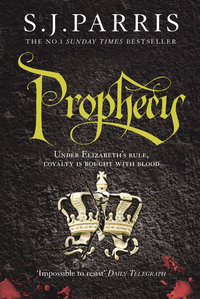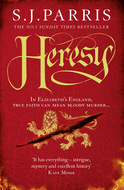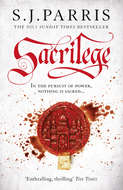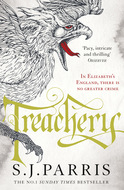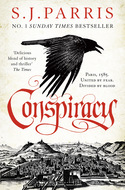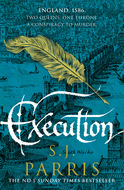Kitap dosya olarak indirilemez ancak uygulamamız üzerinden veya online olarak web sitemizden okunabilir.
Kitabı oku: «Prophecy»
S. J. PARRIS
Prophecy

Copyright
Harper
An imprint of HarperCollinsPublishers Ltd
1 London Bridge Street
London SE1 9GF
First published in Great Britain by HarperCollinsPublishers 2011
Copyright © Stephanie Merritt 2011
Extract from Sacrilege © Stephanie Merritt 2011
Stephanie Merritt asserts the moral right to be identified as the author of this work.
A catalogue copy of this book is available from the British Library.
This novel is entirely a work of fiction. The names, characters and incidents portrayed in it are the work of the author’s imagination. Any resemblance to actual persons, living or dead, events or localities is entirely coincidental.
All rights reserved under International and Pan-American Copyright Conventions. By payment of the required fees, you have been granted the non-exclusive, non-transferable right to access and read the text of this e-book on-screen. No part of this text may be reproduced, transmitted, down-loaded, decompiled, reverse engineered, or stored in or introduced into any information storage and retrieval system, in any form or by any means, whether electronic or mechanical, now known or hereinafter invented, without the express written permission of HarperCollins.
Source ISBN: 9780007317738
Ebook Edition © March 2011 ISBN: 9780007317752
Version: 2019-10-11
Contents
Cover
Title Page
Copyright
Prologue
Chapter One
Chapter Two
Chapter Three
Chapter Four
Chapter Five
Chapter Six
Chapter Seven
Chapter Eight
Chapter Nine
Chapter Ten
Chapter Eleven
Chapter Twelve
Chapter Thirteen
Chapter Fourteen
Chapter Fifteen
Chapter Sixteen
Chapter Seventeen
Chapter Eighteen
Epilogue
Keep Reading …
About the Author
Also by S. J. Parris
About the Publisher
PROLOGUE
Mortlake, House of John Dee
3rd September, Year of Our Lord 1583
Without warning, all the candles in the room’s corners flicker and feint, as if a sudden gust has entered, but the air remains still. At the same moment, the hairs on my arms prickle and stand erect and I shudder; a cold breath descends on us, though outside the day is close. I chance a sideways glance at Doctor Dee; he stands unmoving as marble, his hands clasped as if in prayer, the knuckles of both thumbs pressed anxiously to his lips – or what can be seen of them through his ash-grey beard, which he wears in a point down to his chest in imitation of Merlin, whose heir Dee secretly considers himself. The cunning-man, Ned Kelley, kneels on the floor in front of the table of practice with his back to us, eyes fixed on the pale, translucent crystal about the size of a goose-egg mounted in fixings of brass and standing upon a square of red silk. The wooden shutters of the study windows have been closed; this business must be conducted in shadow and candlelight. Kelley draws breath like a player about to deliver his prologue, and stretches his arms out wide at shoulder height, in a posture of crucifixion.
‘Yes …’ he breathes, finally, his voice little more than a whisper. ‘He is here. He beckons to me.’
‘Who?’ Dee leans forward eagerly, his eyes bright. ‘Who is he?’
Kelley waits a moment before answering, his brow creasing as he concentrates his gaze on the stone.
‘A man of more than mortal height, with skin as dark as polished mahogany. He is dressed head to foot in a white garment, which is torn, and his eyes are of red fire. In his right hand he holds aloft a sword.’
Dee snaps his head around then and clutches my arm, staring at me; the shock on his face must be mirrored in my own. He has recognised the description, as have I: the being Kelley sees in the stone matches the first figure of the sign of Aries, as described by the ancient philosopher Hermes Trismegistus. There are thirty-six of these figures, the Egyptian gods of time who rule the divisions of the zodiac and are called by some ‘star-demons’. There are few scholars in Christendom who could thus identify the figure Kelley sees, and two of them are here in this study in Mortlake. If, indeed, this is what Kelley sees. I say nothing.
‘What says he?’ Dee urges.
‘He holds out a book,’ Kelley answers.
‘What manner of book?’
‘An ancient book, with worn covers and pages all of beaten gold.’ Kelley leans closer to the stone. ‘Wait! He is writing upon it with his forefinger, and the letters are traced in blood.’
I want to ask what he has done with the sword while he writes in this book – has he tucked it under his arm, perhaps? – but Dee would not thank me for holding this business lightly. Beside me, he draws in his breath, impatient to hear what the spirit is writing.
‘XV,’ Kelley reports, after a moment. He turns to look up at us, then over his right shoulder, his expression perplexed, perhaps expecting Dee to interpret the numerals.
‘Fifteen, Bruno,’ Dee whispers, looking again to me for confirmation. I nod, once. The lost fifteenth book of Hermes Trismegistus, the book I had come to England to find, the book I now knew Dee had once held in his hands years earlier, only to be robbed of it violently and lose it again. Could it be? It occurs to me that Kelley must know of his master’s obsession with the fifteenth book.
The scryer raises a hand for silence. His eyes do not move from the crystal.
‘He turns the page. Now he traces … it seems … yes, he makes a sign – quickly, fetch me paper and ink!’
Dee hurries to bring him the items; Kelley reaches out and flaps his hand impatiently, as if afraid the image will fade before he has time to transcribe it. He takes the quill and, still gazing intently into the stone, sketches the astrological symbol of the planet Jupiter and holds it up for our inspection.
I tense; Dee feels it where his hand still holds my arm, and half-turns to look at me with questioning eyebrows. I keep my face empty of expression. The sign of Jupiter is my code, my signature; it replaces my name as the sign that my letters of intelligence are authentic. Only two people in the world know this: myself and Sir Francis Walsingham, Her Majesty’s Principal Secretary of State and chief intelligencer. It is a common enough sign in astrology, and coincidence, surely, that Kelley has drawn it; still I regard the back of Kelley’s head with increased suspicion.
‘On the facing page,’ Kelley continues, ‘he traces another mark – this time, the sign of Saturn.’ This he also draws on his paper, a cross with a curving tail, the quill scratching slowly as if time has thickened while he watches this unfold in the depths of the stone. Dee’s breathing quickens as he takes the paper and taps it with two fingers.
‘Jupiter and Saturn. The Great Conjunction. You understand, I think, Bruno?’ Without waiting for a reply, he turns impatiently to Kelley. ‘Ned – what does he now, the spirit?’
‘He opens his mouth and motions for me to listen.’
Kelley falls silent and does not move. Moments pass, Dee leaning forward eagerly, poised as if held taut on a rope, balanced between wanting to pounce on his scryer and not wishing to crowd him. When Kelley speaks again, his voice is altered; darker, somehow, and he proclaims as if in a trance:
‘“All things have grown almost to their fullness. Time itself shall be altered, and strange shall be the wonders perceived. Water shall perish in fire, and a new order shall spring from these.”’
Here he pauses, gives a great shuddering sigh. Dee’s grip around my arm tightens. I know what he is thinking. Kelley continues in the same portentous voice:
‘“Hell itself grows weary of Earth. At this time shall rise up one who will be called the Son of Perdition, the Master of Error, the Prince of Darkness, and he will delude many by his magic arts, so that fire will seem to come down from heaven and the sky shall be turned the colour of blood. Empires, kingdoms, principalities and states shall be overturned, fathers will turn against sons and brothers against brothers, there shall be turbulence among the peoples of the Earth, and the streets of the cities will run with blood. By this you shall know the last days of the old order.”’
He stops, sinks back gasping on to his heels, his chest heaving as if he has run a mile in the heat. Beside me, I can feel Dee trembling, his hand still holding my wrist; I feel him hungry for more of the spirit’s words, silently urging the scryer not to stop there, unwilling to speak aloud for fear of breaking the spell. For myself, I reserve judgement.
‘“Yet God has provided medicine for man’s suffering,”’ Kelley cries in the same voice, sitting up suddenly and making us both jump. ‘“There shall also rise a prince who will rule by the light of reason and understanding, who shall strike down the darkness of the old times, and in him the alteration of the world shall begin, and so shall he establish one faith, one ancient religion of unity that will put an end to strife.”’
Dee claps his hands gleefully, turning to me with shining eyes and the excitement of a child. It is hard to believe that this is his fifty-sixth autumn.
‘The prophecy, Bruno! What can this be, if not the prophecy of the Great Conjunction, of the ending of the old world? You read this as plain as I do, my friend – through the good offices of Master Kelley here, the gods of time have chosen to speak to us of the coming of the Fiery Trigon, when the old order shall be overturned and the world made anew in the image of ancient truth!’
‘He has certainly spoken of weighty matters,’ I say, evenly.
Kelley turns then, his brow damp with sweat, and regards me with those close-set eyes.
‘Doctor Dee – what is this Fiery Trigon?’ he asks, in his own, somewhat nasal voice.
‘You could not know the significance, Ned, of what your gifts have revealed to us this day,’ Dee replies, his manner now fatherly, ‘but you have translated a prophecy most wondrous. Most wondrous.’ He shakes his head slowly in admiration, then stirs himself and begins to pace about the study as he explains, resuming his authority, the teacher once more. While the séance occurs, he becomes dependent upon Kelley, but it is not his habit to be subservient; he is, after all, the queen’s personal astrologer.
‘Once every twenty years,’ he says, holding up a forefinger like a schoolmaster, ‘the two most powerful planets in our cosmology, Jupiter and Saturn, align with one another, each time moving through the twelve signs of the zodiac. Every two hundred years, give or take, this conjunction moves into a new Trigon – that is to say, the group of three signs that correspond to each of the four elements. And once every nine hundred and sixty years, the alignment completes its cycle through the four Trigons, returning again to its beginning in fire. For the past two hundred years, the planets have aligned within the signs of the Watery Trigon. But now, my dear Ned, this very year, the year of Our Lord fifteen hundred and eighty-three, Jupiter and Saturn will conjoin once more in the sign of Aries, the first sign of the Fiery Trigon, the most potent conjunction of all and one that has not been seen for almost a thousand years.’
He pauses for effect; Kelley’s mouth hangs open like a codfish.
‘Then it is a momentous time in the heavens?’
‘More than momentous,’ I say, taking up the story. ‘The coming of the Fiery Trigon signifies the dawn of a new epoch. This is only the seventh such conjunction since the creation of the world and each has been marked by events that have shaken history. The flood of Noah, the birth of Christ, the coming of Charlemagne – all coincide with the return to the Fiery Trigon.’
‘And this transition into the sign of Aries at the end of our troubled century has been prophesied by many as signifying the end of history,’ Dee agrees, thoughtful. He has arrived in front of his tall perspective glass in its ornate gilt frame that stands in the corner by the west-facing window. Its peculiar property is that it reflects a true image and not the usual reversed image of an ordinary glass; the effect is unsettling. Now he turns to face us and raises his right hand; in the glass, his reflection does the same.
‘The astronomer Richard Harvey wrote of this present conjunction, “Either a marvellous fearful and horrible alteration of empires, kingdoms and states, or else the destruction of the whole world shall ensue”,’ I add.
‘So he did, Bruno, so he did. We may expect signs and wonders, my friends, in the days to come. Our world will change beyond recognition. We shall bear witness to a new era.’ Dee is trembling, his eyes moist.
‘Then – the spirit in the stone – he came to remind us of this prophecy?’ Kelley asks, his face full of wonder.
‘And to point to its special significance for England,’ Dee adds, his voice heavy with meaning. ‘For what can it signify but the overthrowing of the old religion once and for all in favour of the new, with Her Majesty as the light of reason and understanding?’
‘I had no idea,’ Kelley says, dreamy.
I watch him closely. There are two possibilities here. One is that he truly has a gift; I do not yet discount this, for though it has never been granted to me, in other countries I have heard of men who speak with those they call angels and demons through just such showing-stones, or else a speculum made for the purpose, like the one of obsidian that Dee keeps above his hearth. But in my years of wandering through Europe I have also seen plenty of these itinerant scryers, these cunning-men, these mediums-for-hire, who have a smattering of esoteric learning and for the price of a bed and a pot of beer will tell the credulous man anything they think he wants to hear. Perhaps this is snobbery on my part; I cannot help but feel that if the Egyptian gods of time chose to speak to men, it would be to men of learning, philosophers like myself or John Dee, the true heirs to Hermes – not to such a man as Ned Kelley, who wears his ragged cloth cap pulled down to his brow even indoors, to disguise the fact that he has one ear clipped for coining.
But I must be careful what I say to Dee touching Ned Kelley; the scryer has had his feet firmly under Dee’s table since long before I arrived in England, and this is the first time Dee has allowed me to take part in one of these ‘actions’, as he calls them. Kelley resents my recent friendship with his master; I see how he regards me from under the peak of his cap. John Dee is the most learned man in England, but he seems to me unaccountably trusting of Kelley, despite knowing almost nothing of the medium’s history. I have grown fond of Dee and would not like to see him hoodwinked; at the same time, I do not want to fall from his favour and lose the use of his library, the finest collection of books to be found in the kingdom. So I keep my counsel.
With a sudden draught, the study door is thrown open and we all start like guilty creatures; Kelley, with surprising quickness, throws his hat over the showing-stone. None of us is under any illusion; what we are engaged in here would be considered witchcraft, and is a capital offence against the edicts of Church and State. It would only take one gossiping servant to catch wind of Dee’s activities and we could all be facing the pyre; the Protestant authorities of this island, more tolerant in some matters than the church of my native Italy, still strike with force against anything that smells of magic.
Dusty evening sunlight slants through from the passageway outside, and in the doorway stands a little boy, not more than three years old, who looks from one to the other of us with blank curiosity.
Dee’s face crinkles with tenderness, but also with relief.
‘Arthur! What are you about? You know you are not supposed to disturb me when I am at work. Where is your mother?’
Arthur Dee steps across the threshold and at once gives a great shiver.
‘Why is it so cold in your room, Papa?’
Dee casts me a look of something like triumph, as if to say, You see? We were not deceived. He flings wide the shutters of the west window and outside the sun is setting, staining the sky vermilion, the colour of blood.
ONE
Barn Elms, House of Sir Francis Walsingham
21st September, Year of Our Lord 1583
The wedding feast of Sir Philip Sidney and Frances Walsingham threatens to spill over into the next day; dusk has fallen, lamps have been lit and above the din from the musicians in the gallery and the laughter of the guests, the young woman with whom I have been dancing tells me excitedly that she was once at a marriage party that lasted four days altogether. She leans in close when she says this and presses her hand to my shoulder; her breath is laced with sweet wine. The musicians strike up another galliard; my dancing partner exclaims with delight and clutches eagerly at my hand, laughing. I am about to protest that the hall is warm, that I would like a cup of wine and a moment’s respite in the fresh air before I return to the fray, but I have barely opened my mouth when the wind is knocked out of me by a fist between the shoulder blades, accompanied by a hearty cry.
‘Giordano Bruno! Now what is this I see? The great philosopher throwing off his scholar’s gown and lifting a leg with the flower of Her Majesty’s court? Did you learn to dance like that at the monastery? Your hidden talents never cease to astonish me, amico mio.’
Recovering my balance, I turn, smiling widely. Here is the bridegroom in all his finery, six feet tall and flushed with wine and triumph: breeches of copper-coloured silk so voluminous it is a wonder he can pass through a doorway; doublet of ivory sewn all over with seed-pearls; a lace ruff at his neck so severely starched that his handsome, beardless face seems constantly straining to see above it, like a small boy peering over a wall. His hair still sticks up in the front like a schoolboy hastened out of bed. In all the tumult I have not exchanged a word with him since the morning’s ceremony, he and his young bride have been so comprehensively surrounded by high-ranking well-wishers and relatives, all the highest ornaments of Her Majesty’s court.
‘Well,’ he says, grinning broadly, ‘aren’t you going to congratulate me, then, or are you just here for the food from my table?’
‘Your father-in-law’s table, I had thought,’ I answer, laughing. ‘Or which part of the feast did you buy yourself?’
‘You can leave your debating-hall pedantry at home today, Bruno. But I hope you have had enough meat and drink?’
‘There is enough meat and drink here to feed the five thousand.’ I indicate the two long tables at each end of the great hall, spread with the detritus of the wedding banquet. ‘You will be eating left-overs for weeks.’
‘Oh, you may be sure Sir Francis will see to that,’ Sidney says. ‘Today, generosity, tomorrow – thrift. But come, Bruno. You have no idea how it pleases me that you are here.’ He holds his arms wide and I embrace him with sincere affection; I am the perfect height to have his ruff smack me directly in the nose.
‘Watch the clothes,’ he says, only half-joking. ‘Bruno, allow me to introduce you to my uncle Robert Dudley, Earl of Leicester.’
He steps back and gestures to the man who stands a few feet away, at his shoulder; a man of about Sidney’s own height, perhaps in his mid-fifties yet still athletic, his hair steel grey at the temples but his face fine-boned and handsome behind his close-clipped beard. This man regards me with watchful brown eyes.
‘My lord.’
I bow deeply, acknowledging the honour; the Earl of Leicester is one of the highest nobles in England and the man who enjoys greater influence over Queen Elizabeth than any alive. I raise my head and meet his shrewd appraisal. It is rumoured that in their youth he was the queen’s only lover, and that even now their long-enduring friendship is more intimate than most marriages. He smiles, and there is warmth in his gaze.
‘Doctor Bruno, the pleasure is mine. When I learned of your courage in Oxford I was eager to make your acquaintance and thank you in person.’ Here he lowers his voice; Leicester is the Chancellor of the University of Oxford, charged with enforcing the measures to suppress the Catholic resistance among the students. That the movement had gathered so much momentum on his watch had been a matter of some embarrassment to him; my adventures with Sidney there in the spring had helped to disarm it, at least temporarily. I am about to reply when we are interrupted by a man dressed in a russet doublet, with a peasecod belly so vast it makes him look as if he is with child; the earl nods politely to me and I turn back to Sidney.
‘My uncle likes the idea of you. He’s keen to hear more of your outrageous theories about the universe.’ I must look anxious, because he elbows me cheerfully in the ribs. ‘Leicester’s friendship is worth a great deal.’
‘I am glad to have met him,’ I say, rubbing my side. ‘And may I now pay my respects to your bride?’
Sidney looks around, as if for someone to deal with this request.
‘I dare say she is here somewhere. Giggling with her ladies.’ He does not sound as if he is in a hurry to find her. ‘But you are needed elsewhere.’
He turns and bows to my companion, who has discreetly withdrawn a couple of paces to watch us from under lowered lids, her hands modestly clasped together. ‘I am borrowing the great Doctor Bruno for a moment. I will return him to you at some stage. There will be more dancing after the masques.’ The girl blushes, smiles shyly at me and obediently melts away into the brightly coloured, rustling mass of guests. Sidney looks after her with an expression of amusement. ‘Lady Arabella Horton has her sights set on you, it seems. Don’t be fooled by all the fluttering lashes and simpering. Half the court has been there. And she will soon lose interest when she learns you are the son of a soldier, with no capital but your wit and a pittance from the King of France.’
‘I was not planning to tell her that immediately.’
‘Did you tell her you were a monk for thirteen years?’
‘We had not got around to that either.’
‘She might like that – might want to help you make up for lost time. But for now, Bruno, my new father-in-law suggests you might like to take a turn in the garden.’
‘I have not yet had the chance to congratulate him.’
But it is clear that this is business. Sidney rests a hand on my shoulder.
‘No one has. Do you know, he disappeared for two hours altogether this afternoon to draft some papers? In the middle of his own daughter’s wedding party?’ He smiles indulgently, as if he must tolerate these foibles, though we both know that Sidney is in no position to complain; financially, he needed this marriage more than young Mistress Walsingham, who I suspect entertains greater romantic hopes of it than her new husband.
‘I suppose the great machinery of state must keep turning.’
‘Indeed. And now it is your turn to grease the wheels. Go to him. I shall find you later.’
On all sides we are pressed by those who wish to congratulate the bridegroom; they jostle, aggressively smiling and attempting to shake his hand. In the mêlée I slip away towards the door.
Outside, the night air is hard-edged with the first frost of autumn and the grounds are quiet, a welcome relief from the celebrations inside. In the knot-garden close to the house, lanterns have been lit and couples walk the neatly cultivated paths, murmuring, their heads close together. Even in the shadows, I can see that Sir Francis Walsingham is not to be found here. Stretching my arms, I strain my head back to gaze up at the sky, the constellations picked out in bright silver against the ink-blue of the heavens, their arrangement different here from the sky above Naples where I first learned the star-patterns as a boy.
I reach the end of the path and still there is no sign of him, so I set off across the open expanse of lawn, away from the lit paths, towards an area of woodland that borders the cultivated part of the garden at the back of Walsingham’s country house. As I walk, a lean shape gathers substance out of the shadows and falls into step beside me. He seems made of the night; I have never seen Walsingham wear any suit other than black, not even today, at his daughter’s wedding, and he wears still his close-fitting black velvet skullcap, that makes his face yet more severe. He is past fifty now and I have heard he has been ill this last month – one of the protracted bouts of illness that confines him to his bed for days at a time, though if you enquire after his health he swats the question away with a flick of his hand, as if he hasn’t the time to consider such trifles. This man, Queen Elizabeth Tudor’s Principal Secretary, though he may not seem an imposing figure at first glance, holds the security of England in his hands. Walsingham has created a network of spies and informers that stretches across Europe to the land of the Turks in the east and the colonies of the New World in the west, and the intelligence they bring him is the queen’s first line of defence against the myriad Catholic plots to take her life. More remarkably still, he seems to hold all this intelligence in his own mind, and can pluck any information he requires at will.
I had arrived in England six months earlier, at the beginning of spring, sent by my patron King Henri III of France to stay for a while with his ambassador in London in order to spare me the attentions of the Catholic extremists who were gathering support in Paris, led by the Duke of Guise. I had barely been in England a fortnight when Walsingham asked to meet me, my long-standing enmity with Rome and my privileged position as a house guest at the French embassy making me ideally suited to his purposes. Over the past months, Walsingham is a man I have grown to respect deeply and fear a little.
But his cheeks are hollowed out since I last saw him. He folds his hands now behind his back; the noise of the celebrations grows fainter as we move away from the house.
‘Congratulazioni, your honour.’
‘Grazie, Bruno. I trust you are making the most of the celebrations?’
When he converses alone with me, he speaks Italian, partly I think to put me at ease, and partly because he wants to be sure I do not miss any vital point – his diplomat’s Italian being superior to the English I learned largely from merchants and soldiers on my travels.
‘Out of curiosity – where did you learn our English dances?’ he adds, turning to me.
‘I largely make them up as I go along. I find if one steps out confidently enough, people will assume you know what you are doing.’
He laughs, that deep rolling bear-laugh that comes so rarely from his chest.
‘That is your motto in everything, is it not, Bruno? How else does a man rise from fugitive monk to personal tutor to the King of France? Speaking of France –’ he keeps his voice light – ‘how does your host, the ambassador?’
‘Castelnau is in good spirits now that his wife and daughter are newly returned from Paris.’
‘Hm. I have not met Madame de Castelnau. They say she is very beautiful. No wonder the old dog always looks so hearty.’
‘Beautiful, yes. I have not spoken to her at any length. I am told she is a most pious daughter of the Catholic Church.’
‘I hear the same. Then we must watch her influence over her husband.’ His eyes narrow. We have reached the trees, and he gestures for me to follow him into their shadows. ‘I had thought Michel de Castelnau shared the French king’s preference for diplomatic dealings with England – so he claims when he has audience with me, anyway. But lately that fanatic the Duke of Guise and his Catholic Leaguers are gaining strength in the French court, and in your letter last week you told me that Guise is sending money to Mary of Scotland through the French embassy –’ He pauses to master his anger, quietly striking his fist into the palm of his hand. ‘And what need has Mary Stuart of Guise money, hm? She is more than generously provided for in Sheffield Castle, considering she is our prisoner.’
‘To secure the loyalty of her friends?’ I suggest. ‘To pay her couriers?’
‘Precisely, Bruno! All this summer I have laboured to bring the two queens to a point where they are prepared to hold talks face to face, perhaps negotiate a treaty. Queen Elizabeth would like nothing better than to give her cousin Mary her liberty, so long as she will renounce all claim to the English throne. For her part, I am led to believe that Mary tires of imprisonment and is ready to swear to anything. That is why this traffic of letters and gifts from her supporters in France through the embassy troubles me so deeply. Is she double-dealing with me?’
He glares at me as if he expects an answer, but before I can open my mouth, he continues, as if to himself:
‘And who are these couriers? I have the diplomatic packet intercepted and searched every week – she must have another means of delivery for her private letters.’ He shakes his head briskly. ‘While she lives, Mary Stuart is a banner to rally England’s Catholics, and all those in Europe who hope to see a papist monarch back on our throne. But Her Majesty will not move pre-emptively against her cousin, though the Privy Council urges her to see the danger. This is why your presence in the French embassy is more crucial to me than ever, Bruno. I need to see every communication between Mary and France that passes through Castelnau’s hands. If she is plotting against the queen’s sovereignty again, I must have hard evidence that incriminates her this time. Can you see to it?’
